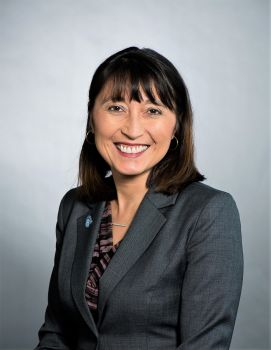LWG Interview: All You Need To Know About The Northwest Women’s Leadership Academy
By LWG Editor
The NW Women’s Leadership Academy is an exciting pilot program officially sponsored by the Washington City-County Management Association (WCMA) to advance women from a variety of backgrounds in local government into leadership roles. League CAO, Pam Antil sat down with one of its founders, Mercer Island City Manager Julie Underwood, to learn more about the event. Here is the interview:
Pam: The Academy looks like an amazing program and opportunity for women. How did it come into being?
Julie: This concept came from a discussion held at the NW Regional City Managers Conference in April 2017. The conference topic was, “Promoting Women in the Profession.” Naturally, we started off by discussing the ICMA Task Force Report on Women in the Profession. We discussed various models that support women in the profession like Women Leading Government and The Legacy Project.
Hats off to Rachael Fuller, Assistant City Manager, Gresham, Oregon for coming up with the concept of creating a women’s leadership academy in the northwest. She pitched the idea to a group of us; we got some advice from ICMA Senior Advisors; and then we both pitched the concept to each of our state association boards. We received resounding support from WCCMA and OCCMA. Oregon launched their Academy February 2018 and we’ll be launching ours September 2018.
Pam: It sounds exciting! What is the goal of the NW Women’s Leadership Academy?
Julie: The overarching goal for the Academy is to improve and increase the pipeline of local government executives who are prepared and excited to compete for the Chief Executive Officer job! Additionally, we have the following objectives:
- Provide professional and moral support
- Provide opportunities to enhance skills and competencies and confidence building
- Provide opportunities to network and expand professional connections
- Promote more women in leadership roles among elected and appointed officials
- Provide opportunities of women from a diversity of backgrounds and experiences to obtain skills, competencies, and confidence to move into local government leadership roles.
Pam: How will applicants be selected for the first cohort?
Julie: The design of the Academy included conducting a focus group of likely applicants/participants. This provided helpful feedback and has guided the design of the entire Academy from the curriculum to the application process. For example, several of the focus group participants noted that having the Chief Executive Officer (city manager or administrator) be required to endorse them as a candidate could be a possible barrier. While we encourage the endorsement of the CEO, we do not require it as part of the application process. Instead, we simply require that an immediate supervisor agree to and supports their application. In addition to submitting an online application, candidates are required to create a short video answering the following two questions:
- What perspective will you bring and how will you contribute to the success of this initial leadership academy?
- How would your participation in the leadership academy help you advance along your career pathway?
We are aiming for the Class of 2019 to include mid-level managers/supervisors/assistant directors/directors/assistant city managers/assistant to the city managers, from diverse local government organizations (city, county, transit agencies, special districts, etc.) and disciplines, as well as including a balance of age, race and abilities.
Moreover, we want the class size to be small – no more than 30. We believe this will help to achieve our objective of building a close personal team of moral support, especially helpful as one advances in their career. OCCMA had a positive response and had 50 applicants – we’re optimistic that WCCMA will also see lots of interest.
Pam: Can you describe the content and setup of the Academy?
Julie: The focus group validated our initial thought of having a balance of “hard skills” and “soft skills.” As many of us who have been in this field a long time know, it’s the lack of soft skills that get us into trouble! Nevertheless, the focus group participants noted that their lack of confidence sometimes stems from their perceived lack of competence in the hard skills. The six full days – one full day held every other month, includes the following focus areas:
- Leadership and ethics
- Governance structure – legislative bodies and appointed executives
- Communication strategies and nurturing trust
- Strategic planning
- Finance and budgeting
- Labor relations and negotiations
- Life work balance, confidence, and self-awareness
- Interviewing, resume prep, and working with recruiters
Pam: Do you mind sharing a little bit about your own career path for our readers?
Julie: I had a pretty “old school” career path – starting as an intern in the City Manager’s Office. I did the typical ladder going from intern to the Assistant to the City Manager for the City of Rockville, MD. I climbed to the next rung and worked as the Assistant City Manager for the City of Shoreline, WA. When my manager retired, I competed for the City Manager position and was appointed.
I served in that role in Shoreline for just under three years when my husband was recruited to a tech company in the Bay Area. I was fortunate to work as the Assistant City Manager for the City of Daly City, CA before returning to the Pacific Northwest and being appointed City Manager for the City of Mercer Island. WA. For my entire career I have only worked in the City Manager’s Office. Today we’re seeing great managers come from operations and departments.
Pam: There is lots written about mentors and advocates, who were those special people in your career? How did they help you?
Julie: I have been fortunate that early in my career I worked with two strong, intelligent women leaders: Julia Novak and Catherine Tuck Parrish in the City of Rockville. They are outstanding role models who continue to advise me today. Also, in my corner mentoring me were Steve Burkett and Bob Olander in the City of Shoreline. These two mentors groomed me specifically for the city manager role. When I struggled to find self-confidence, they, and many others like department directors and peers along the way, always encouraged and believed in me.
Pam: What advice do you have for women who aspire to become a chief executive in local government?
Julie: Don’t let your self-critic get in the way of achieving this goal. We often hold ourselves back from applying and stepping up. Listen to the inner voice that wants to serve and make a difference. Let that person lead the way.
Pam: Thanks Julie! We can’t wait to hear all about the Academy after the cohort gets started.
Apply here by July 13th to be part of the first cohort of approximately 30 women in the Leadership Academy. The selection process will be completed by mid-August, and admitted applicants will be expected to make a commitment to participating in the program by the third week in August.
____________________
Julie was hired in January 2017 as Mercer Island’s sixth City Manager and she is the first woman and person of color to serve in the position. She is also an Island resident, and lives on the south end with her husband and three children. Prior to Mercer Island, Julie was the Assistant City Manager of Daly City, California, a suburb of San Francisco, since March 2014. Prior to Daly City, from February 2011 until October 2013, Julie was the City Manager for the City of Shoreline, Washington. Julie also served as Shoreline’s Assistant City Manager since July 2002. Before moving to the Pacific Northwest, Julie was the Assistant to the City Manager for the City of Rockville, Maryland, a suburb of Washington, DC.
Julie has a Master’s in Public Administration from Virginia Tech and a BA from George Mason University and is a Credentialed Manager with the International City-County Management Association (ICMA).

Pamela “Pam” W. Antil has over 25 years of experience directly managing and advising local government agencies across the country including small and large cities such as San Jose, CA, Ann Arbor, MI and Palo Alto, CA. Currently, she is the Assistant City Administrator for the City of Santa Barbara, CA.
Ms. Antil has been recognized for her published articles and papers on a variety of topics including advancing women in local government; the future of policing in the United States; business networking; innovation and design thinking; post-merger/operational due diligence in the private sector; and use of social media by local government. An avid networker herself and early adopter of social media in government, Ms. Antil founded the Municipal Managers group on LinkedIn in 2007, which has over 12,000 members today and the League of Women in Government in 2015, supporting the advancement of women in local government.
Pam is an active member of the International City/County Management Association, Cal-ICMA, Alliance for Innovation, Municipal Management Assistants of Northern & Southern California, BJA Executive Session on Police Leadership, Emerging Local Government Leaders as well as serves as a Board Member for Women Leading Government CA and President of the League of Women in Government. Pam is an ICMA Credentialed Manager, has a Bachelor’s degree from Central Michigan University and a Master of Public Administration degree from California State University. She is the mother of two children, Sydney and Peyton, and resides in Santa Barbara, California.



